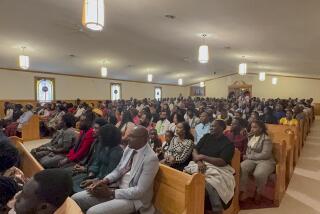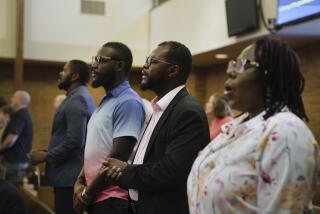Readying Boats, Haitians Look to Clinton as Savior : Caribbean: Plan to modify policy against turning back all fleeing islanders has made him a figure of hope.
- Share via
CAIRA, Haiti — Two idols are under construction in this seaside village’s primitive shipyard. One is real: a 30-foot red, white and blue wooden sailboat. The other is a dream: President-elect Bill Clinton as savior.
The boat sits a few yards from the lapping waves of Port-au-Prince Bay. The vessel, as well as the seven others under construction here, are ideal for shoreline sailing, toting light cargo from nearby town to town and sometimes carrying passengers.
But in the months since a military overthrow of Haiti’s first democratic government on Sept. 29, 1991, these crude ships have also been instruments of faith, vessels used by the nearly 40,000 Haitians who have tried to escape to Florida.
Most of the time, the ships were intercepted by the U.S. Coast Guard. Their passengers were taken for processing at the American naval base at Guantanamo Bay, Cuba, then returned. Or they were simply taken directly to Haiti, with their claims for political asylum ignored. As a result, there have been few attempts in recent weeks.
But the idea of an armada of overloaded boats and rafts crammed with illiterate, impoverished Haitians washing up on Florida’s shore has been resurrected by Clinton’s statements that he would modify, if not negate, the previous policy to return all refugees.
So once again, these ships made of hand-shaped planks are being seen as symbols of hope and change, a way that Haitians imagine they can reach the milk and honey on the other side.
“My God, yes, I would go in this boat. Of course, when the time is right, all the people here would go,” said Osnel Fenechon, 33, a shipwright who has spent the last two months working on the brightly colored vessel that sits on the muddy beach waiting for a buyer.
What is most important in Fenechon’s words is the concept of timing. If the people become desperate enough or think they can get away with it, they will take to whatever boats are available. They have in the past, and they will again.
But, for now, they prefer to count on the magic they see in Clinton.
“It’s up to Clinton. Yes, I’ve heard of Clinton. He is President,” said Fenechon with a fervor in his voice usually found in those who are in awe of some supernatural force.
To ballooning numbers of Haitians, particularly the desperately poor, Clinton is such a force. Because he has spoken, albeit vaguely, of ending the Haitian crisis that began more than a year ago when the military deposed the democratically elected government of President Jean-Bertrand Aristide, Clinton has developed, whether he wants to or not, a near-godlike image here. It surpasses by far the hopes and expectations of even his most fervent American supporters.
To Haitians, he is the deliverer who will create a world of democracy, justice and prosperity. “It is amazing,” says an American missionary who has lived in Haiti for more than 30 years. “They have turned Clinton into a Christlike figure.”
The belief by Haitians in salvation from the outside is a near religion, one that covers everything from politics to road building. “The French gave us this road,” said a Haitian during a recent three-hour drive down the potholed coastal highway that runs along the north shore of the country’s southern peninsula. “It’s up to them to repair it. We shouldn’t have to do it.”
But now with the country exhausted by economic deprivation, near starvation and unrelenting oppression, this dependency on the outside world for relief has assumed mystical qualities.
Listen to Joechim LaFluer, a 38-year-old boat builder. “Clinton will fix everything. He will bring back (exiled leader) Aristide, he will end the embargo and he will let Haitians enter the United States.”
And this from Serge Aomain, who builds boats further down the coast at the port city of Petit Goave: “Clinton will do something to make our life better, I know that.” He knows this, Aomain says, because “I think Clinton is a democrat and an American. Americans are the ones who caused our problems and they have to fix them and democrats are the people who want to help us.”
Conversations with Haitians in various parts of the country indicate their ideas or idealizations of Clinton are based on several factors. One is their belief that the popular Aristide is a democrat and since Clinton is a democrat, he must be for them.
A more substantial reason is an informal but pervasive underground communications network of Aristide followers who have shaped Clinton’s occasional comments on Haiti into a promised policy of liberation.
“I’ve heard that Clinton has threatened the (Haitian) army, and, if they try to stop him from returning Aristide, he will order in the 82nd Airborne,” Fritz Saturin, a 39-year-old illiterate, unemployed fisherman, said, referring to the famed U.S. Army division.
What he has heard is a fair reflection of what Aristide’s agents are saying throughout the country in an effort to frighten the ruling army and force it into backing off its refusal to permit the exiled president’s return.
But if the Haitian peasant has a near-religious faith in Clinton, it is not a monotheistic religion. If the Clinton idol turns out to have feet of clay, there is the other--the boat. A U.S. Coast Guard survey taken earlier this month counted 635 boats that could be used for a try at Miami; there were 113 more under construction.
In reality, this is not an unusual number, particularly for an island nation where fishing is an important occupation and the sea is the major route for transporting goods. In fact, since 500 boats were confiscated or destroyed by the Coast Guard over the last year in failed attempts to reach Florida, there are actually fewer ships available than in the past.
But there are enough, diplomats say. “Right now, we don’t think the conditions are right for a mass migration. But when and if they decide to go, they will go,” said one official of the desperate Haitians.
The factor that will matter would be a feeling among the poor that Clinton has failed. “We are waiting for Clinton,” said Claude Mimi, another boat builder at Caira. “But if we don’t get Aristide, if nothing changes we will go. We are waiting to see what Clinton is going to do.”
More to Read
Sign up for Essential California
The most important California stories and recommendations in your inbox every morning.
You may occasionally receive promotional content from the Los Angeles Times.













